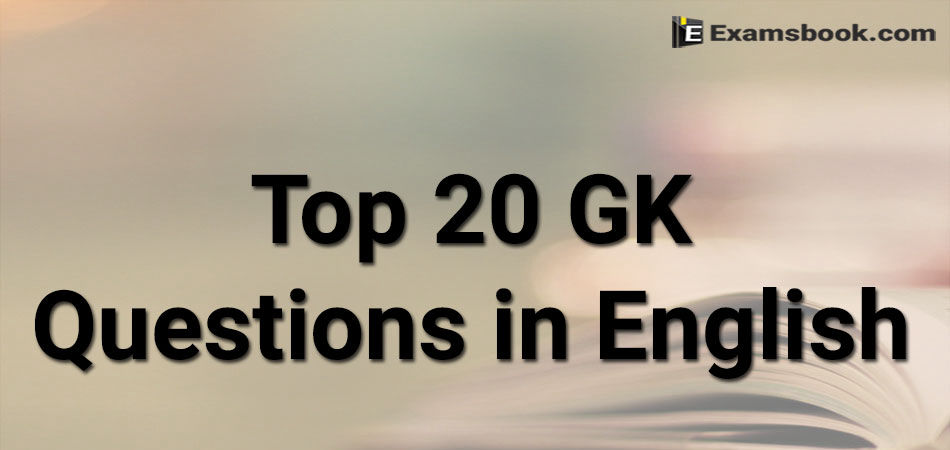Top 20 GK Questions in English

General Knowledge is the most important for competitive exams. That is the reason students search for important general knowledge questions and answers. So, here in this blog, you can read top 20 gk questions in English for your competitive exams.
GK Questions with Answers
Keep practice these important and top 20 general knowledge questions in English without wasting your time which will help to obtain score high in competitive exams. You can start your practice by General Knowledge Test Series and Mock Tests as well as check your performance.
Also, Read Latest Current Affairs Questions 2023: Current Affairs Today
"Put your knowledge to the test and excel with our General Knowledge Mock Test and Current Affairs Mock Test!"
GK Questions
Q : How many members of the Rajya Sabha are nominated by the President?
(A) 5
(B) 12
(C) (1/5) of the total members
(D) 10
Correct Answer : B
Explanation :
The Rajya Sabha should consist of not more than 250 members - 238 members representing the States and Union Territories, and 12 members nominated by the President.
For how long can the President of India retain a bill in pocket veto?
(A) one month
(B) six months
(C) twelve months
(D) indefinitely
Correct Answer : D
Explanation :
A pocket veto is a kind of veto enjoyed by the President of India by keeping a bill on his table indefinitely without giving or refusing assent. He will not take any action on the bill under Pocket veto. The first president to use Pocket Veto was Gyani Zail Singh.
A member of the Union Public Service Commission can be removed
(A) by the President
(B) by the Prime Minister
(C) by the Chief Justice of the Supreme Court
(D) by the Chairman of the Union Public Service Commission
Correct Answer : A
Explanation :
It laid down the manner in which a member of a Public Service Commission may be suspended or removed. The President was empowered to remove a member of a Public Service Commission in two instances – (i) proof of misbehaviour and (ii) automatic disqualification.
Who was the President of the Republic of India who always called Indian secularism as 'Equality of all religions'?
(A) Dr. S. Radhakrishnan
(B) Dr.Zakir Hussain
(C) Dr. Rajendra Prasad
(D) Giani Zail Singh
Correct Answer : A
Explanation :
Dr. S. Radhakrishnan is the only President who always called Indian secularism as equality of all religions.
Who presides over the joint sitting of Parliament?
(A) Prime Minister
(B) President
(C) Speaker of Lok Sabha
(D) Chief Minister
Correct Answer : C
Explanation :
The Speaker of the Lok Sabha presides over the joint sitting of the Lok Sabha and the Rajya Sabha. The Deputy Speaker of the Lok Sabha presides in his absence.
Who decides the disputes relating to the election of the President?
(A) Supreme Court
(B) Election Commission
(C) Parliament
(D) Both the Supreme Court and the High Court
Correct Answer : A
Explanation :
The Supreme Court has the right to take decision in any dispute related to the election of the President.
Who is the first President to sail in a submarine in India?
(A) K. R. Narayanan
(B) Dr. A.P.J. Abdul Kalam
(C) V.V. Giri
(D) N. Sanjeev Reddy
Correct Answer : B
Explanation :
n 13 February 2006, during the submarine's deployment in Vishakhapatnam under the Eastern Naval Command, the then President of India A. P. J. Abdul Kalam became the first Indian head of state to sail in a submarine.
The President of the Indian Union has the same constitutional powers as
(A) With the British king (queen)
(B) U. S. A. have the president of
(C) Name the President of Pakistan
(D) With the President of France
Correct Answer : A
Explanation :
Powers and duties. Under the draft constitution the President occupies the same position as the King under the English Constitution.
When the offices of both the President and the Vice-President of India are vacant, who will do their work?
(A) Prime Minister
(B) Home Minister
(C) Chief Justice of India
(D) Lok Sabha Speaker
Correct Answer : C
Explanation :
The correct answer is The Chief Justice of India. The President( Discharge of Functions) Act, 1969 states that the chief justice of India shall act as the President of India in case of the offices of both the President and Vice-President being vacant.
Under which of the following pardoning power of the President, the term of punishment is reduced without changing its nature?
(A) commutation
(B) avoidance
(C) postponement
(D) procrastination
Correct Answer : B
Explanation :
Under remission, the duration of sentence is reduced without changing its character. Under commutation, the punishment is changed to another. Under respite, less sentence is awarded. Under reprieve, the sentence is suspended temporarily.



